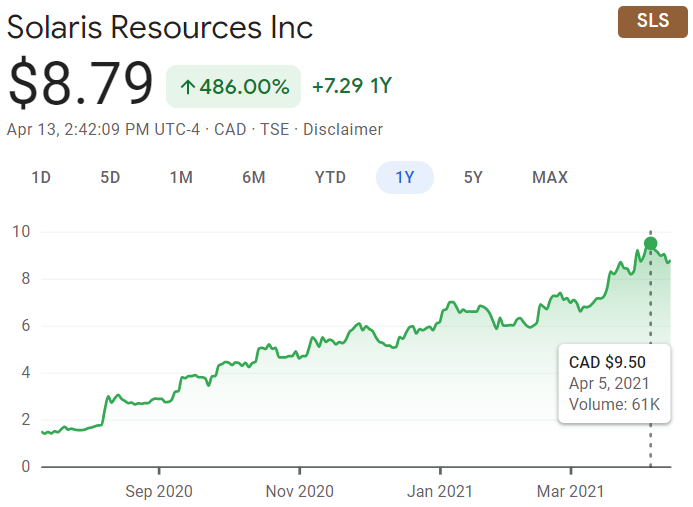
Pure Energy Minerals (TSX-V: PE) / (OTC: HMGLF) / (Frankfurt: AHG1) is the second most advanced Nevada (NV) lithium junior. The Company is advancing its Clayton Valley Project, one of very few brine-based lithium projects outside of South America. In my opinion, the dozen or more juniors owning, controlling, optioning or attempting to earn into prospective lithium-bearing property in NV, are 24-36 months behind. The Company has assembled a land package of just over 9,300 acres next door to the only producing lithium brine mine in North America. Pure Energy has been entirely focused on Esmeralda County, NV lithium opportunities since 2013. [All in C$] [Please see Corporate Presentation]
With the exception of Western Lithium, only one other NV junior has completed meaningful exploration work. Like Pure Energy, Dajin Resources is one of the earlier lithium settlers in the State. Based on press releases by Dajin, it is probably 12-18 months ahead of the pack.
Pure Energy stands out by having delineated a NI 43-101 compliant Inferred Resource of 816,000 Metric tonnes Lithium Carbonate Equivalent (LCE). This Spring, the Company plans to deliver an updated resource report followed by a Preliminary Economic Assessment (PEA) several months later. The Clayton Valley project, adjacent to Albemarle Corp’s Silver Peak brine operation, has made great strides towards possibly becoming the nation’s next source of lithium.
By contrast, most new entrants have barely moved the ball forward. Admittedly, a select few presumably have favorable attributes, cheap stocks or attractive long-term call option value. Pure Energy is different, it has de-risked its project a lot compared to peers. Make no mistake, investments in aspiring lithium companies, including Pure Energy, are highly speculative. Still, I strongly believe that the Company’s current valuation offers investors a compelling risk adjusted investment opportunity.
While Pure Energy’s valuation is above most in NV, it’s well below the valuations of Canadian & Australian-listed lithium companies. The top 7 pre-production peers have an average market cap of about $142 million. Pure Energy’s market cap of $35 million is one-fourth the average.
Pure Energy has considerably more blue-sky potential than higher valued, pre-production peers. Although others might be closer to production, Pure Energy is trading at a 75% discount. I ask readers, which stock has more potential upside over the next 6-12 months, Australia-listed producer Orocobre Ltd or Pure Energy? My bet is on Pure Energy. I think the stock price could double or triple before Orocobre’s stock was up by 50% or 100%. If the Company’s valuation were to double, commensurate with Orocobre’s moving 50% higher, the Company would trade at just one-tenth that of Orocobre’s valuation.
Readers are encouraged to compare Pure Energy’s status with that of other popular lithium juniors. To reiterate, the Company has a higher valuation, but the premium is warranted. Readers beware, in many cases lower valuations are not what they appear. How many capital raises might earlier-stage peers need to catch up to where Pure Energy is today?
If readers take nothing else away from this bullish article, consider this; an investment in Pure Energy allows shareholders to have their speculative lithium cake, and eat it to. Like those with lower valuations, Pure Energy’s upside potential is tremendous, however, unlike peers — the Company’s fundamental downside is much lower (my opinion only).
How many Nevada juniors can boast these accomplishments?
++ Pure Energy has delivered a NI 43-101 compliant Inferred resource report of 816,000 Metric tonnes Lithium Carbonate Equivalent (LCE).
++ Pure Energy is working closely with two industry leaders (Bateman Advanced Technologies & POSCO), developers of cutting edge lithium processing technologies. [Scroll down for excellent video of Bateman’s technology]
++ Bateman will soon be testing representative brine from Pure Energy’s Clayton Valley project at its mini pilot plant in Israel. Data generated from testing is expected to enable Pure Energy to report preliminary estimates of op-ex & cap-ex.
++ Pure Energy entered into a conditional 5-year lithium hydroxide supply agreement, sourcing products from Clayton Valley to deliver to the Giga-factory, located 3.5 hours away. The Company remains on track to report an updated NI 43-101 compliant resource within 60 days and deliver a PEA several months later.
++ The Department of Energy has released the remaining funds for Pure Energy’s work with SRI International (a research & innovation center), to develop novel cost-effective methods for lithium extraction from geothermal brines.
++ The University of British Columbia & Pure Energy received a grant from the Natural Sciences & Engineering Research Council of Canada. [Please see Corporate Presentation]
These ongoing collaborations / milestones and the pending resource report, followed by a PEA, demonstrate that Pure Energy has advanced well beyond peers. Time is money, a prime property in southern Nevada’s “Lithium Hub,” with a 3-year head start, is worth a sizable amount to larger companies looking to expand or enter the lithium sector. Pure Energy is ideally positioned to sign on with a strategic partner to pursue value-creating corporate initiatives. The ability to commence operations this decade is likely of paramount importance to a number of potentially interested parties.
Conclusion
Given the incredible strength in lithium prices over the past several months, (reports of a tripling in certain spot prices), any lithium junior fortunate enough to reach commercial production, would have the world at its feet. However, a lithium junior with a market cap of, $5 to $20 million, still facing significant and unavoidable dilution on the path to PEA, may not be as attractive as it appears. Instead, a relatively more advanced player, like Pure Energy Minerals (TSX-V: PE) / (OTC: HMGLF) / (Frankfurt: AHG1), less than 6 months from a PEA, offers a very compelling risk-adjusted investment opportunity.
Disclosures: Many of the companies mentioned have small market caps, including Pure Energy Minerals. Small market cap stocks are highly speculative, not suitable for all investors. I, Peter Epstein, own shares of Pure Energy and Dajin Resources. Mr. Epstein, CFA, MBA, is not a licensed financial advisor. Readers should take that fact into careful consideration before buying or selling any stocks mentioned.
Readers are encouraged to consult with their own investment advisors before buying or selling stocks, especially speculative ones. At the time that this article was posted, Pure Energy Minerals & Dajin Resources were sponsors of: http://EpsteinResearch.com. Please consider visiting: http://EpsteinResearch.com for free updates on small caps across a range of sectors. While there, enter an email for instant updates. Thank you for your support.



 Follow us on Twitter
Follow us on Twitter Become our facebook fan
Become our facebook fan











Comments are closed.